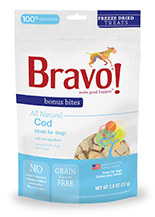Bravo Bonus Bites Freeze Dried Cod Review
PawDiet has been helping pet owners since 2015. To fund our efforts, articles may include affiliate links; if you buy something through a link, we may earn a commission.
Review of Bravo Bonus Bites Freeze Dried Cod
According to our most recent data, this product is intended for intermittent or supplemental feeding only.
Review of Ingredients
In our review of Bravo Bonus Bites Freeze Dried Cod, we'll examine all 1 ingredients and highlight the nutritional contribution of each ingredient.
While the first few ingredients typically dominate the recipe's composition, ingredients in small quantities can still have a meaningful impact on the overall nutritional profile of the recipe.
Cod is a lean fish that's high in protein, low in fat and filled with vitamins and minerals essential for your dog's health.
Review of Guaranteed Analysis
The guaranteed analysis for Bravo Bonus Bites Freeze Dried Cod indicates a very high crude protein minimum of 80.00%. This is not surprising given that the sole ingredient in this pet food product is cod. Fish are known to be excellent sources of protein, and since this product is freeze-dried, the moisture content is greatly reduced, which concentrates the protein content. The drying process removes water, leaving behind the protein-rich flesh of the cod, which is why the protein content is so high.
Crude fat at a minimum of 5.00% is also derived from the cod itself. Fish contain natural oils and fats, which are preserved during the freeze-drying process. Although cod is not as fatty as some other types of fish, it still contains a sufficient amount of fat to meet this guaranteed analysis value. The percentage is relatively low compared to the protein content, reflecting the lean nature of cod as a fish variety.
The crude fiber maximum of 1.00% is very low, which is typical for animal-based products since they do not contain plant-based fibers. Since the only ingredient is cod, the fiber content would naturally be minimal. Any fiber present would likely be from the minute, indigestible parts of the fish, such as scales or bones that are not fully removed during processing.
The caloric content of 3660.00 kilocalories per kilogram is a measure of the energy provided by the food. This is a cumulative result of the macronutrients present in the food, primarily the protein and fat from the cod. Since protein and fat are calorically dense nutrients, the high protein content and the moderate fat content of the cod contribute to the overall caloric value of the pet food.

